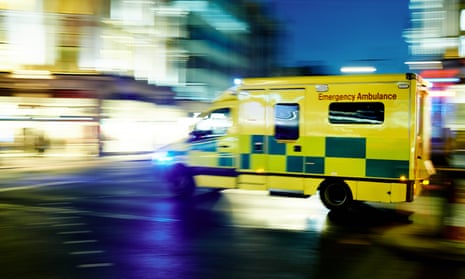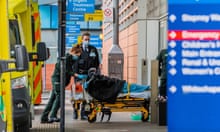Ambulances are taking almost an hour to reach patients who have had a suspected stroke or heart attack, more than three times the 18-minute maximum wait, the latest NHS data shows.
Ambulance crews in England took an average of 59 minutes and seven seconds to respond to “category two” 999 calls, the second most serious category of incident. That also includes people suffering from an epileptic fit, major burn or sepsis, which kills 48,000 people a year.
The almost hour-long delay recorded in July was the second longest since records began after the one hour, one minute and five second response time to such calls experienced in March.
In another sign of the extreme pressure on England’s 10 regional ambulance services crews took on average nine minutes and 36 seconds to attend life-threatening emergencies – the joint longest delay on record. These are “category one” incidents in which the patient needs immediate medical attention because they are having a cardiac or respiratory arrest or severe allergic reaction, for example.
The delays in July were worse than the nine minute and six second average response time recorded in June. Ambulance services’ struggle to meet waiting time targets came as they experienced unprecedented pressure, with staff dealing with 85,397 category one callouts – the most ever.
One in 10 such patients waited at least 16 minutes and 55 seconds, another record high.
The Liberal Democrats said that the figures showed that people calling 999 could no longer rely on an ambulance responding promptly.
“Behind these figures lie heartbreaking stories of people left waiting hours in pain and distress for an ambulance to arrive. It is utterly shocking that when people call 999 they can no longer be confident that they will get the emergency care they need,” said Helen Morgan, the party’s communities and local government spokesperson.
“Liz Truss herself has admitted that under the Conservatives people are facing appalling ambulance delays. Yet neither she nor Rishi Sunak have set out a credible plan to solve this crisis.”
Morgan called for ambulance services to receive extra funding and the Care Quality Commission, the NHS watchdog, to investigate long responses to 999 calls.
There have been major declines in ambulance response times in recent years and growing numbers of reports of patients left for many hours in pain and distress.
All 10 ambulance services went on their highest form of alert last month amid a heatwave and Covid-related staff absences. One NHS boss told the Health Service Journal then that the situation was “dire for staff and patients” while another said that delays in crews handing over patients to A&E staff were “possibly the worst ever and it’s only July”.
In April Deborah Lee, the chief executive of Gloucestershire Hospitals NHS trust, tweeted how, after suffering a suspected stroke at home, her husband had driven her to hospital after hearing her “lamenting ambulance delays. What if my husband hadn’t been there and my daughter had called for an ambulance and I’d been put in the Cat 2 ‘stack’?”, she said.
Thursday’s latest NHS monthly performance statistics contained more grim findings.
after newsletter promotion
The number of people in England waiting to start routine hospital treatment has risen to a new record high of 6.7 million. More than 350,000 patients have been waiting more than a year to be seen – one in 20 patients.
A total of 520,000 patients (519,917) – another record – waited more than four hours in England’s major A&E departments last month, with just 57% of patients being admitted, transferred or discharged within the four-hour target, which states that 95% of attendees should be dealt with within that time.
“We are seeing the sharp demise of the health service and we are seeing little to no political will to act on or acknowledge the crisis – neither of the [Conservative] leadership candidates seem to recognise the scale of the crisis at hand,” said Dr Adrian Boyle, the vice-president of the Royal College of Emergency Medicine, which represents A&E doctors.
The health service also missed all eight of its main cancer targets last month. More than 5,700 patients – a record 40% of the total – waited more than two months for treatment after an urgent referral by a GP. The target is for 85% of patients to be seen within two months.
NHS England highlighted the service’s progress in reducing the number of people on the waiting list for hospital care who had been waiting for at least 18 months. They fell from 75,992 in January to 53,911 in June. Earlier this week it claimed to have virtually eradicated two-year waits for care by the deadline of the end of July.
“Today’s figures show the immense pressure our emergency services are under with more of the most serious ambulance callouts than the NHS has ever seen before, at levels more than a third higher than pre-pandemic,” said Prof Sir Stephen Powis, the organisation’s national medical director.
“Recognising the pressure on urgent and emergency care services, we are working on plans to increase capacity and reduce call times ahead of winter in addition to our new contract with St John Ambulance to provide extra support as needed.”










